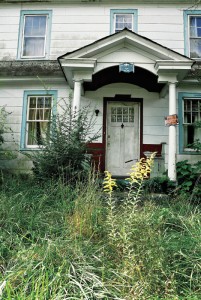Next Door Nuisance — Impact of vacant homes concerns Naperville residents
By Karen Dix
October 2012 View more Community
 Many Naperville residents are noticing an unwelcome addition to their neighborhoods these days. Vacant homes, once an icon for urban blight, are becoming increasingly common. Thanks to a waning economy, more existing and unfinished homes are standing empty due to financial stress, foreclosure, or an owner’s inability to find renters. When the vacant house sports an unsightly exterior and an overgrown lawn advertising that the home is unoccupied, neighbors become understandably concerned, not only about the aesthetics of their neighborhood, but public safety and property values too.
Many Naperville residents are noticing an unwelcome addition to their neighborhoods these days. Vacant homes, once an icon for urban blight, are becoming increasingly common. Thanks to a waning economy, more existing and unfinished homes are standing empty due to financial stress, foreclosure, or an owner’s inability to find renters. When the vacant house sports an unsightly exterior and an overgrown lawn advertising that the home is unoccupied, neighbors become understandably concerned, not only about the aesthetics of their neighborhood, but public safety and property values too.
All property owners, whether privately owned or owned by an institution, are bound to city ordinances regarding maintenance. Grass should not exceed five inches in height in the right-of-way and eight inches on private property. Weeds are only permitted in designated natural landscape areas. If the law is not observed, what happens next is usually a combination of city intervention and neighborly involvement.
A MOVE TO OCCUPANCY
The City of Naperville has received an increasing number of calls about code violations at vacant houses, which led to action by City Councilman Chirico this spring. He proposed a fine increase for negligent property owners, who, as of this printing, receive a $100 citation for non-compliance and a modest $35 charge for city mowing, which Chirico believes may actually give landlords an incentive not to mow. “In the case of some foreclosed homes, or those in the foreclosure process, it is sometimes difficult to know who is responsible for the home. Homeowners simply walk away and the bank is in the process of taking the property. When there is no one to enforce the code upon, the city needs to take responsibility to protect the community,” Chirico said. “I am hopeful that increasing fees for city mowing encourages compliances rather than the other way around.”
Jack Persin of Ryan Hill Realty in Naperville, is co-president of the Mainstreet Organization of Realtors, the largest realtor association in Illinois. He said the issue of neglected exteriors has not been of concern to the membership in conducting their business. However, Naperville residents may expect to see fewer vacant homes on their streets in the future. While the median sales price of Naperville homes has dropped 5.5% for attached single family homes and 3.8% for detached single family homes from 2009-2012, the number of real estate contracts is rising.
“We’re seeing a trend towards more short sales than foreclosures,” said Persin. The term ‘short sale’ means the home is worth less than the amount owed on the mortgage. Persin said approving a short sale is a drawn out process that requires the seller to prove financial hardship, but lenders are being pressured by Washington to cut through the red tape more quickly. Banks are also offering cash incentives for owners to do short sales instead of pursuing a costly foreclosure process. “Banks would rather have someone in the house than have it go into foreclosure, where they have to maintain the property,” Persin said.
GETTING INVOLVED
Sgt. Greg Bell, Naperville police community affairs officer, claims Naperville has not seen a rise in property crime with the increase in vacant houses in the area. However, he said the police are usually not informed by the owner when homes become vacant. “If owners call, we can put the house on a vacation watch,” said Bell. Neighbors can also make the difference by keeping an eye on the property, keeping the premises clear of newspapers or advertisements, and making the home look lived in as much as possible. “If it looks like the community is invested in the neighborhood, that’s a crime deterrent,” added Bell.


